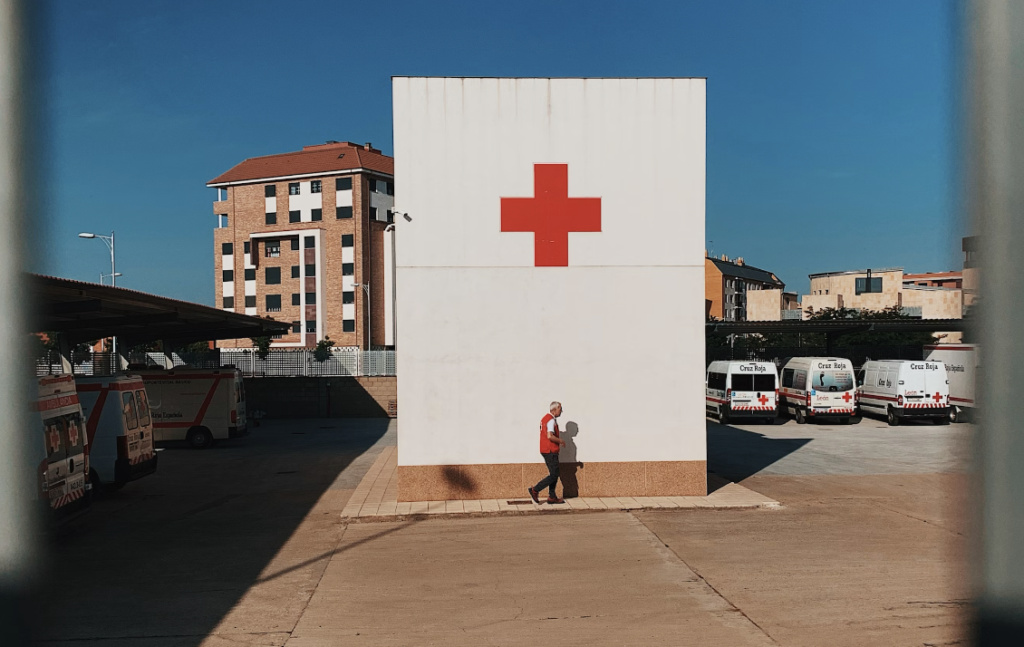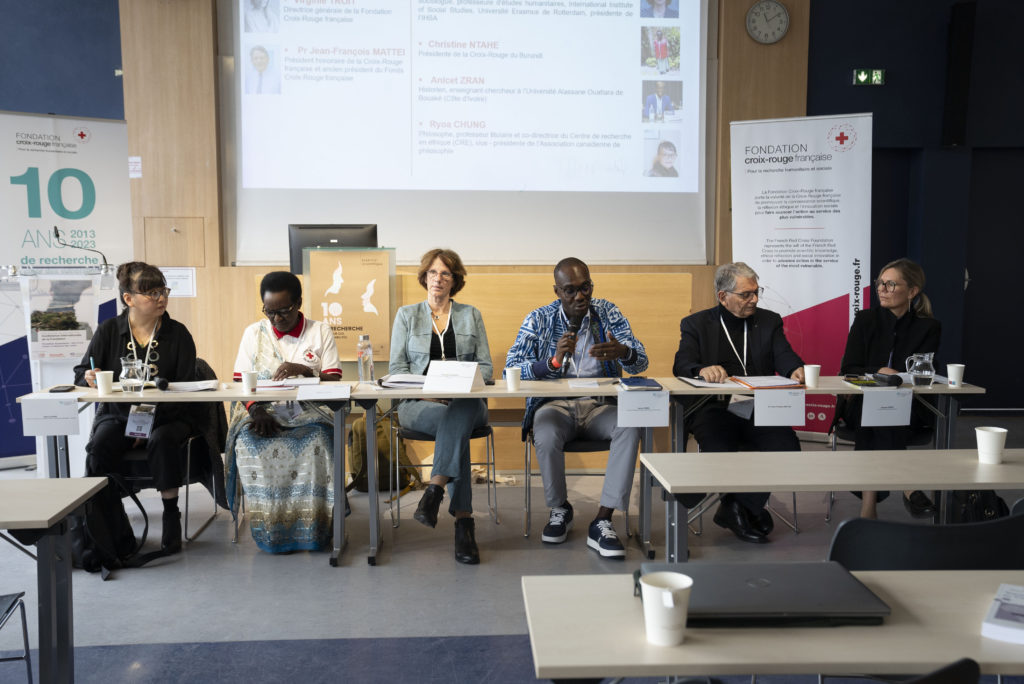
Faced with the unprecedented internal and external challenges facing organisations in the humanitarian and social sector, the French Red Cross Foundation is proposing an innovative approach: using research to learn, adapt and support vulnerable people during and between crises. The Foundation, which celebrated 10 years of commitment to humanitarian and social research last October, promotes scientific knowledge, ethical reflection and social innovation to advance action in the service of the most vulnerable.
Virginie Troit, Director of the French Red Cross Foundation, explains the vital importance of research and how it can help humanitarian aid practitioners.
On the 26th October, the French Red Cross Foundation discussed 10 years of research at the heart of vulnerability through an international conference and the release of a publication. What do you remember about this event?
Virginie Troit – Above and beyond the extraordinary determination of all the participants to make progress on all the global and local challenges that they all face in their respective roles, the key takeaway was the confirmation that we are on the right track and that we must persevere with our missions as a whole.
Not only as part of the French Red Cross body, but also to contribute to the scientific dynamics within the International Red Cross and Red Crescent Movement and our professional field. We were the first to be impressed by the community of academics, practitioner colleagues and motivated students that the day brought together at Sciences Po Paris and the richness of their dialogue. Such an event allowed us not only to take stock of the research questions we had launched, but also of the methods used and the results obtained. Through the panel discussions and our publication “L’Essentiel, 10 ans de recherche au cœur des vulnérabilités” (The Essential: 10 years of research into vulnerability), it was also an opportunity for us to share the benefits that we see every day at the Foundation of closer collaboration between researchers and those involved in humanitarian and social action.

The first round table was devoted to the “Humanitarian Transition”. What do you mean by “Humanitarian Transition” and what role does the French Red Cross play in this issue?
Virginie Troit – The Foundation, as an initiative of the French Red Cross, developed the notion of humanitarian transition, as the sector needed it, just like the ecological, energetic or food transition. We met the organisers during the preparations for the World Humanitarian Summit (WHS) at the regional consultations in 2014. Since the end of the 1990s, the humanitarian system has been undergoing changes that are more profound than those it experienced during the major crises of the 20th century. This is a paradigm shift that we absolutely must understand and anticipate if we are to be better prepared.
The transformation of crises which last and are juxtaposed on unprecedented scales, the blurring of the boundary between war and peace, the arrival on the scene of new actors and donors, emerging practices such as cash transfers, boosted by new technologies, and new geopolitical conditions in which the sovereignty of states is expressed more firmly, are all factors which must enrich our operational, institutional and ethical approaches to the relationship between the person receiving support, and the person providing it.
The round table highlighted the fact that we no longer have just one humanitarian system, but several, which we need to understand, the priority of including the countries of the South, whether for local humanitarian organisations or for the researchers closest to the crises, and the absolute need to return to an ethical approach, particularly in care.
A second round table was devoted to the experience of migration. What can the researchers you have accompanied tell us about the situation, and how can their contributions help to improve existing humanitarian practices?
Virginie Troit – The research in the humanities and social sciences that we have supported is aimed at gaining a better understanding of the survival and life trajectories of exiles, and producing new knowledge about the conditions under which they are received and the path they take.
It has also highlighted the experiences of those on the front line, from individual citizens’ initiatives to formal structures and diaspora action. On a highly politicised subject, it is important to observe phenomena, to gather experiences in order to methodically feed civil society policies and programmes, and to avoid at all costs stereotypes and misconceptions that could compromise solidarity actions. The round table demonstrated the added value of combining the perspectives of sociology, geography and political science with NGOs such as SOS Méditerranée and Médecins du Monde, and unique research consortia such as the Institut Convergences Migrations, to highlight the lack of analysis of gender issues, which are still underestimated, the criminalisation of solidarity, the creation of discourse, and the mobilisation of legal bodies between national and international law.
We know that climate change is leading to an increase in the frequency and intensity of natural disasters. What can research tell us about how to think about and deal with future disasters?
Virginie Troit – The round table devoted to this subject, following on from the work we have been doing in sub-Saharan Africa, in metropolitan France and in the French overseas territories, showed that the social sciences can make a difference in understanding the effects of climate change on health, improving the preparedness of populations and volunteers, understanding the consequences of disasters on social cohesion, and the factors that make territories vulnerable. In particular, the question of representations and perceptions is particularly important in ensuring that the systems in place work, are effective, and respect vulnerable people. The results of the research, at both local and international level, also make it possible to work towards a better link between the different levels of action, whether we are talking about global governance or territorial mechanisms. Of course, funding will have to be made available to work on all stages of resilience, before, during and after a disaster, so that recovery and anticipated risk management go hand in hand, while avoiding a substitution of roles, with each player assuming its responsibilities.
Lastly, what issues are specific to research in the humanitarian sector and what challenges must we collectively meet in the coming years?
Virginie Troit – There are many, but I’d like to highlight three of them.
The first is the realisation that civil society organisations working with the most vulnerable can no longer do without long-term cooperation with researchers and the academic world, given the growing complexity and volume of the challenges they face. Combating misinformation through scientific methods and the production of new data is also a priority if we are to avoid growing polarisation and a decline in the solidarity and social ties that are their raison d’être.
Another issue is “localisation”, an agenda that emerged in the field of international aid in 2016 to promote aid that is “as local as possible and as international as necessary”, but which is just as valid for research. We need to strengthen more concretely the participation and inclusion of researchers from all continents, particularly from the countries most affected by crises, to listen better to societies and contribute to the global scientific debate on humanitarian issues in a more equitable way.
Strengthening cooperation between practitioners on the front line of vulnerability and researchers from all disciplines is not an insignificant step. Private and public funders must understand that reconciling the funding of humanitarian and social operations with research and innovation will strengthen their impact on society. But there are too few budget lines that allow this to happen. Devoting more space and budget to dialogue between researchers, civil society organisations and innovative decision-makers definitely contributes to better use of resources and a more ethical approach to the people we support.
The recent development of our Bénévo’Lab programme, in which research is inspired by volunteers from the French Red Cross, and our new social innovation method, APRIS (Atelier post-recherche et innovation sociale), which proposes action plans based on the results of research, show that with few resources and a committed dialogue between researchers and stakeholders, it is thrilling and not so difficult to shift boundaries.




